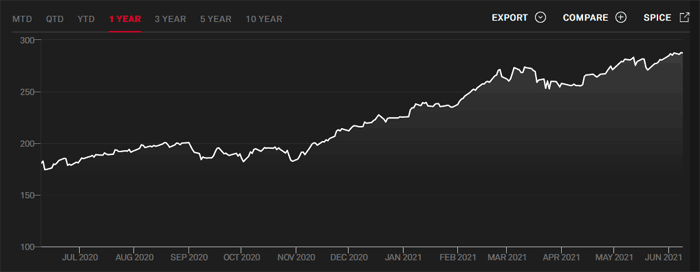In case you haven't noticed, the price of almost everything consumers and business need and use is rising in price - a lot.
I was going to use this column to wrap up my coverage of the Gartner Top 25 Supply Chain list, but decided to change direction bases on yesterday's economic news: US consumer prices rose a significant 5.0% year-over-year, after a concerning 4.2% jump in April, according to new Labor Department data.
Gilmore Says.... |
 |
So will see. Dust off the inflation playbooks collecting dust for decades. Forward buying, commodity price hedging, that's sort of thing..
|
 |
What do you say? |
|
| Click here to send us your comments |
| |
|
|
|
The May number was the highest monthly jump since 2008. But the price jumps then were primarily the result of soaring oil pricing for a while that summer to near $150 per barrel. We know what happened to the economy not long after that: a deep financial crisis and recession triggered (in great simplicity) by soaring home prices and reckless mortgage loans on those inflated property values.
So it appears, broad-based supply chain inflation is back, for the first time in a long time, now at last manifested in the prices consumers pay, after some delay from the start of rising input and commodity prices.
It is an odd scenario. Demand for most goods has been surging, while supply can't keep up. That's due to a perfect storm of factors: continued labor shortages, port congestion and delays, and - most fundamentally - shortages early in the supply chain that ripple through and cause shortages in downstream goods.
The obvious example of that is the semiconductor shortage, which has had a significant impact on production of many items, since just about everything has a chip in it these days. Car production, especially for higher end vehicles that have more chips in them, is way down as result.
Then add in a container ship gets stuck sideways in the critical Suez Canal and blocks traffic for a week. I'll term that a black swan event.
Consumer demand, which in the end drives everything, is now juiced by record levels of savings during the recession, continued soaring stock market levels, and in the US more stimulus checks to nearly everyone. That even though clearly many of us and the economy as a whole don't need it. In addition, the payments provide a disincentive to some to get back into the workforce and address the labor shortage.
It's easy to pick out examples of the cost increases. Start with US gasoline prices being at a seven-year high, with some predicting a return to $100 per barrel oil later this summer.
The prices for iron ore, copper and steel, key materials in making cars, houses, appliances and more, have hit record price levels in recent weeks. But that's hardly all the input prices rising rapidly. The S&P Commodity Index , which tracks price changes across a basket of metals, energy, and agricultural products, has jumped about 60% in the past 12 months.
Lumber prices are up nearly 300% versus a year ago, adding tens of thousands of dollars to the cost of new homes.
You get the idea.
I also recently ran into a new term: shrinkflation. It refers to the practice of consumer goods companies in the face of higher costs sneakily shrinking the package size - but keeping the price the same. Case in point: Walmart's Great Value paper towels recently went from 168 2-ply sheets per roll to just 120. The price, at $14.97, remained the same for a dozen rolls despite the nearly 30% drop in the total number of sheets. Not such a great value.
S&P Commodity Index is Up 59% in Past Year

Except for that brief period in 2008, this is a scenario few of us remember well. Over several decades, the Federal Reserve has struggled for inflation to reach its target level of about 2% annually. It appears that is not going to be a problem in 2021.
Some say the price trends will be temporary. Others say action must be taken now to curb inflation before it become systemic. For example, rising prices cause workers to demand wage hikes, which increases costs and leads companies to raise prices, which fuels further inflation, etc.
"Neglecting inflation leaves global economies sitting on a time bomb," Deutsche Bank economists warned in a research note this week. If central banks wait too long to raise interest rates they will be forced into "abrupt" policy changes, causing significant disruption to markets and the economy.
Think Ronald Reagan and Paul Volcker's moves to stem fierce inflation in the early 1980s - triggering a deep recession.
High inflation is bad for about everyone.
This from investment legend Warren Buffet at a recent investor conference: "Inflation acts as a gigantic corporate tapeworm. That tapeworm preemptively consumes its requisite daily diet of investment dollars regardless of the health of the host organism. Regardless of a company's profits, it has to spend more on receivables, inventory, and fixed assets to simply equal the unit volume of the previous year."
So we will see. Dust off the inflation playbooks collecting dust for decades. Forward buying, commodity price hedging, that sort of thing.
Let's fervently hope this latest data is a blip and not a trend.
What do you think of this inflation threat? Let us know your thought at the Feedback section below.
Your Comments/Feedback
|